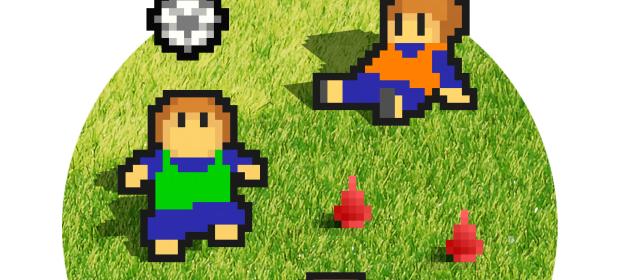WHACK! Aubert launches the ball forward. SMASH! Colt City’s central defender hits it straight back. Pires takes a touch, brings the ball down… only to pass it straight to Laing, Colt City’s top goal scorer. YES! The home crowd erupts as Laing effortlessly knocks the ball into the top corner, sending Colt City 1-0 up against the mighty Kirton Town and their brand new manager.
As you can imagine, my first game in charge of Kirton Town in Nintendo Pocket Football Club did not end well. My team seemed incapable of playing any decent football. They played like Boston United from the 2006-2007 season (there’s a reference I bet no one gets), our only attacking threat came from long balls up to our front men, which the defenders from Colt City managed to cut out every time. Their decisions angered me, why couldn’t they just bring the ball down and pass it around, like any competent footballer – I was ready to quit.
 I persevered, partly thanks to the stereotypical coach telling me I can improve my team with Training Cards. These are special types of training a player can do between games, that will boost a number of the player’s key attributes, and one player can use up to three cards per week. Cards can also be combined in certain orders to make a special type of training. Combining Running and Dribbling will result in Wing Attack training, which will boost a players stats more than the individual cards.
I persevered, partly thanks to the stereotypical coach telling me I can improve my team with Training Cards. These are special types of training a player can do between games, that will boost a number of the player’s key attributes, and one player can use up to three cards per week. Cards can also be combined in certain orders to make a special type of training. Combining Running and Dribbling will result in Wing Attack training, which will boost a players stats more than the individual cards.
Fortunately, after a short amount of time and some tactical use of training cards, my team started to improve. Aubert transitioned into a solid all-round midfielder with C-ratings across all of his key attributes; Pires, despite his mistakes in the opening game, became my rock at the back, with a B-rating for strength, making him one of the most formidable defenders in the league. But what really changed my team was bringing in De Winter, a pacey striker from league rivals Felix Royale. De Winter was an expensive acquisition, in fact he became the second highest paid player in my team and took up (almost) my entire remaining budget – but it was totally worth it.
De Winter’s pace up front meant that the Boston United style worked. Long balls over the top would be chased down, pounced upon, and every once in a while would be volleyed straight into the back of the net. De Winter revolutionized Kirton Town, and results started to go our way.
 In fact, that one player really changed my opinions of my Nintendo Pocket Football Club. Before he joined, I hated my team. We lost almost all our first few games, and the football was reminiscent of a D league team of under sevens. After I signed him up the football didn’t exactly improve, but results started to go our way. We climbed the league table and became feared by all teams in the league, I started to accept that the long ball tactic was the only way to play.
In fact, that one player really changed my opinions of my Nintendo Pocket Football Club. Before he joined, I hated my team. We lost almost all our first few games, and the football was reminiscent of a D league team of under sevens. After I signed him up the football didn’t exactly improve, but results started to go our way. We climbed the league table and became feared by all teams in the league, I started to accept that the long ball tactic was the only way to play.
Nintendo Pocket Football Club is certainly a lot more fun once you start winning. Unfortunately, winning always seems to come as a result of having better players than your opponents. Sure, as a manger you can set the main zones you want the team to play in as well as telling them to try and score all the time or sit back and wait for chances, but these managerial decisions don’t appear to effect the games a awful lot. As with most games of football you can make up to three substitutions in a match, and as each sub enters the pitch you can make changes to the aforementioned tactics or signal an opposition player to mark, but the changes don’t appear to do much. That didn’t stop me tactically making substitutions to tell the team to sit back once we got a 2-0 lead in the first round of the cup, however.
Nintendo Pocket Football Club doesn’t have the depth of other managerial games, but it doesn’t really need it. Building a solid team is what the game is about, not using tactics to win a match. For some this may be a let down, as tactics and mind games are incredibly fun, but for others (especially the younger audience) Nintendo Pocket Football Club will be perfect. The simplistic gameplay will keep you playing for hours, you can sign your very own De Winter, train up your own Aubert, or decide if your Pires should be given a second chance – and isn’t that kind of fun what games are all about?





